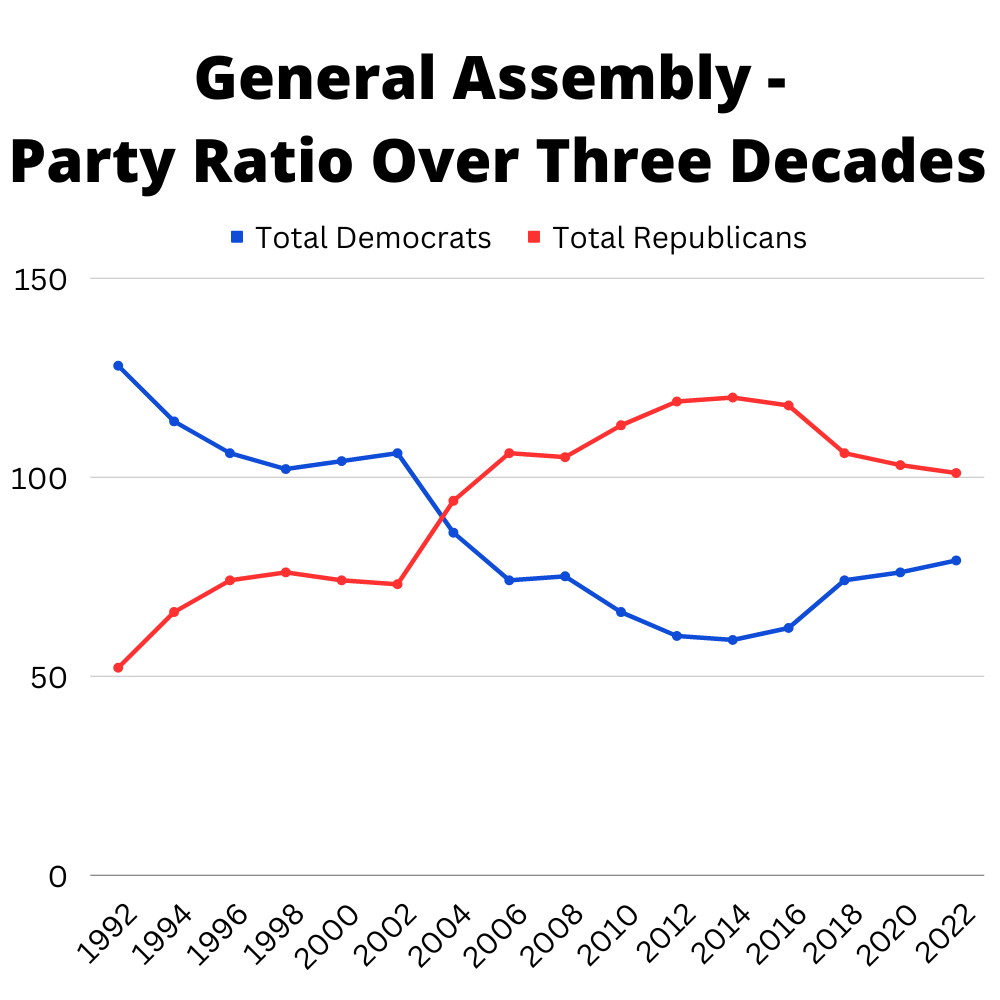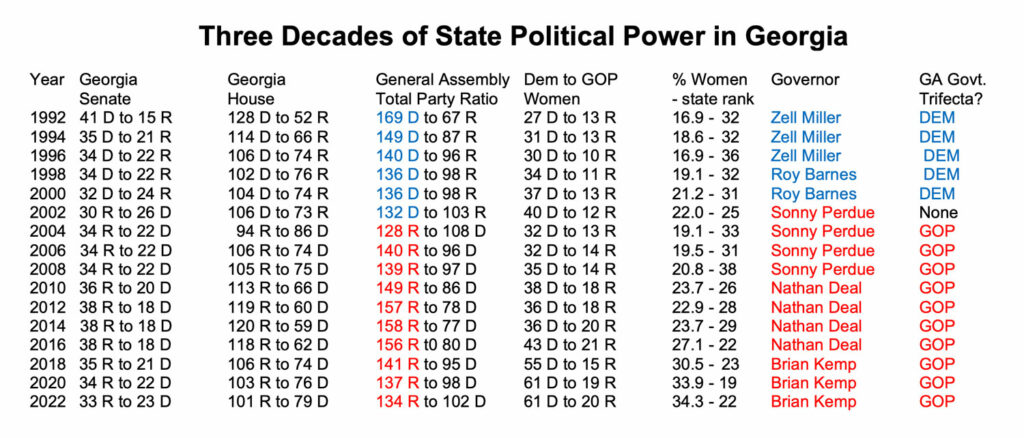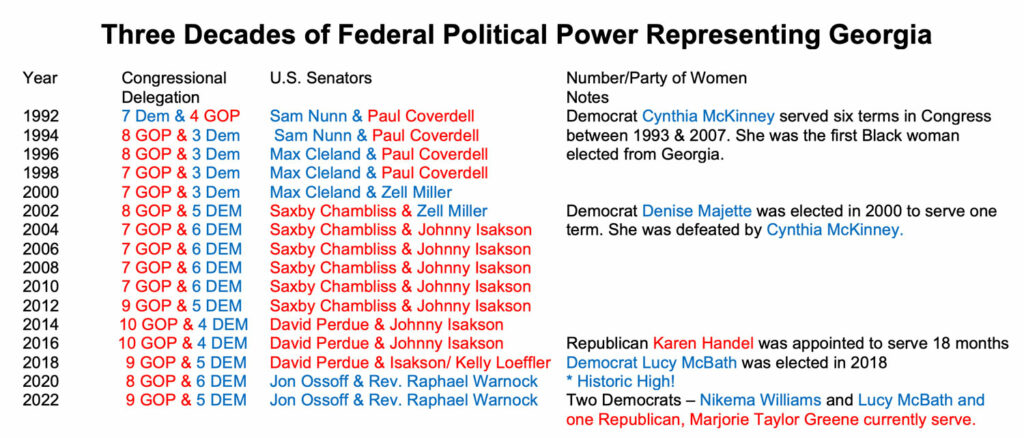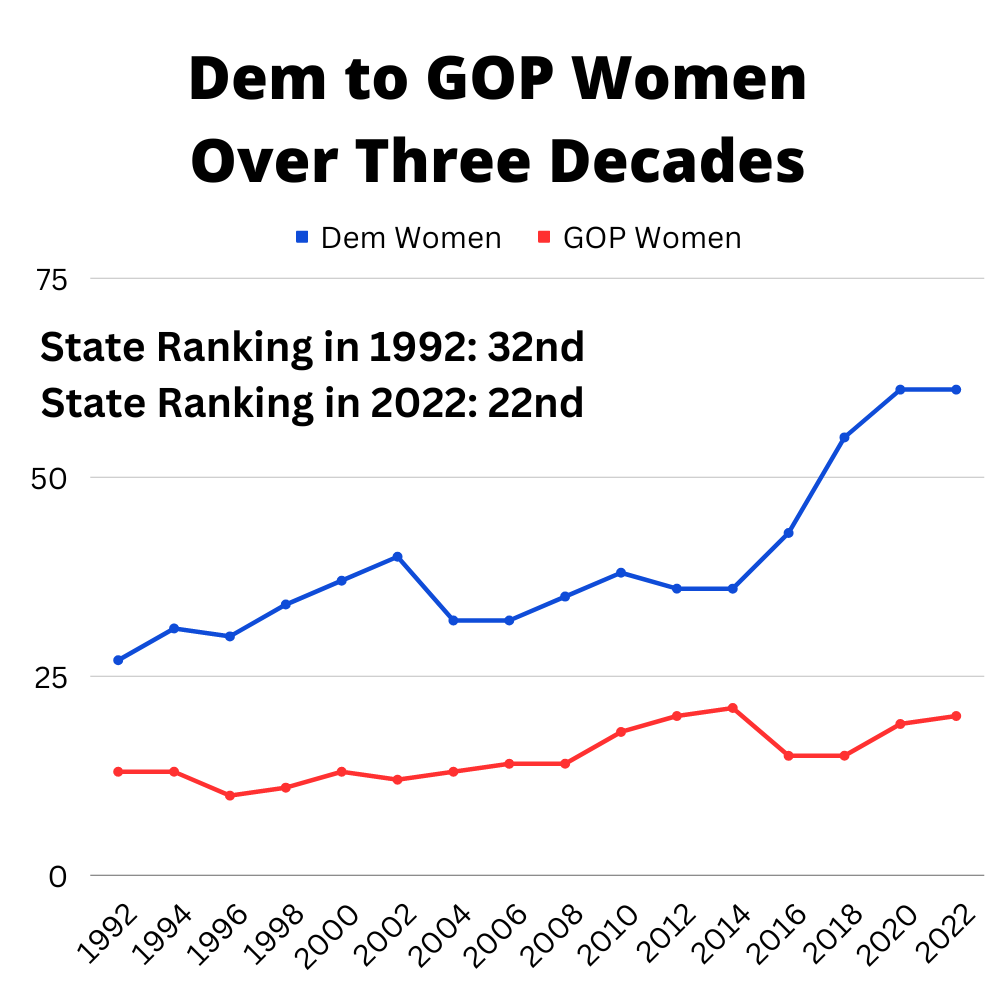
Last week’s United States Supreme Court ruling in Allen v Milligan upheld long-standing Voting Rights Act protections against district maps which dilute the power of minority voters, clearing the way for three cases challenging the constitutionality of Georgia’s 2022 maps to be heard.
Three Georgia cases were earlier consolidated by Northern District of Georgia Judge Steve C. Jones who suspended action last year once it became clear SCOTUS would rule on a similar case arising from Alabama. Once the Allen v Milligan ruling which orders a re-draw of Alabama maps was issued, Judge Jones moved quickly to establish a schedule for moving the Georgia cases forward. Attorneys have until June 22 to file supplemental briefs of 25 pages or less and until August 2 to file responses to those briefs. A pre-trial conference is set for August 15 and the trial date if necessary is set for September 5.
At stake is whether congressional, state senate and state house maps drawn during a special session in late 2021 by the Republican controlled Georgia General Assembly for the 2022 election cycle will continue to be used moving forward. Numerous legal analysts predict a ruling which would mandate re-drawn Georgia maps for Congressional and legislative districts.
“Today’s Supreme Court decision, Allen v. Milligan, keeps in place long-standing – and still critical – Voting Rights Act protections against district maps that dilute the power of voters of color,” Rahul Garabadu, voting rights staff attorney with the ACLU of Georgia, said in a statement. “The decision’s conclusions also underscore the unlawfulness of the State of Georgia’s maps, which the ACLU of Georgia and its partners are currently challenging in court. We applaud this decision and look forward to soon seeing similar relief for voters in our Georgia redistricting challenge.”
“Today’s ruling reaffirms the Voting Rights Act’s essential role in countering efforts to dilute the voting strength of communities of color. Those challenging Georgia’s redistricting maps under Section 2 of the VRA — and asking courts to order Georgia to draw additional majority-Black districts — will use this ruling to their advantage,” Jack Genberg, senior staff attorney with the Southern Poverty Law Center, which is also representing plaintiffs in one of the challenges, told The Georgia Recorder last week.
Plaintiffs in the Georgia cases allege the Georgia congressional map drawn based on 2020 census data violates Section 2 of the VRA because it dilutes the voting strength of Georgians of color, particularly Black Georgians, and denies these voters an equal chance to participate in the political process. Court filings also allege Republicans chose to “pack” and “crack” Black voters across multiple districts to weaken their influence rather than creating additional congressional districts, five or six additional House districts and three additional Senate districts which would have allowed Black voters to elect candidates of their choice.
During the 2022 election cycle, only five Georgia legislative contests were “competitive” – meaning the margin of victory was less than seven percentage points. By comparison, in 2020, there were 18 similarly competitive contests and in 2018, there were 21 competitive contests. Georgia’s competitive legislative districts in 2022 were all in metro Atlanta’s rapidly changing suburbs. Those districts were won by HD 108 Rep. Jasmine Clark, a Democrat from Lilburn; HD 117 Rep. Lauren Daniel, a Republican from Locust Grove; SD 7 Sen. Nabilah Islam, a Democrat from Lawrenceville; HD 105 Rep. Farooq Mughal, a Democrat from Dacula; and HD 53 Rep. Deborah Silcox, a Republican from Sandy Springs.
When the VRA was enacted in 1965, the 11 former Confederate states had a total of three Black state legislators. Today there are roughly 300. In 1965, only 475 Black Americans held elective office anywhere in the nation; today, there are more than 640 Black mayors alone, representing 48 million citizens. In 1965, only 6.7 percent of Black Mississippians were registered to vote; three years later, the figure had risen to nearly 60 percent. Black voter turnout in a handful of states — Mississippi, Alabama and Louisiana among them — exceeded the turnout by white voters last November.
Over the years, the VRA’s reach grew to cover bias against Latinos, Asian Americans, Native Americans and other groups, making a law initially aimed at racism in the Deep South equally important for addressing voting rights in Alaska, Utah, Illinois and elsewhere. After nationwide maps were re-drawn in 2021 and 2022, 46 lawsuits were filed in 22 states, based on reporting in Rollcall. Most of the litigation originated in the South: Texas led with eight lawsuits alleging state political district maps which were racially discriminatory, followed by five cases in Georgia, four in Alabama and three each in Arkansas, Illinois and Louisiana.
Texas has 36 Congressional Districts and Georgia has 14 — changes in Congressional maps for these two states alone could clear the way for Democrats to gain the five congressional seats they currently need to re-establish a House majority. Therefore, the outcome of pending litigation in Georgia and Texas is critical for Congressional control.
Georgia was said by many to be the “center of the political universe” in 2022. The coming court battles, subsequent re-districting if ordered by the courts and the 2024 election cycle will make 2022 seem tame by comparison. Georgia will continue to be “center of the political universe” at least thru November 2024. However, political power in Georgia has been shifting for years as Democrats took advantage of demographic diversity to chip away at the Georgia GOP trifecta first established in 2004.
Republicans now hold nine of 14 Georgia Congressional seats – down from ten between January 2015 and January 2019. In the General Assembly, Republicans currently hold a 33 to 23 majority in the state Senate and a 101 to 79 majority in the state House. In the past two decades, the pinnacle of Georgia GOP state legislative power was a 38 seat Senate Supermajority between 2013 and 2017 and 120 House seat majority for the 2015-6 legislative session. See graphic and charts below for details.

Democratic gains since 2016 – Five Senate Seats and 17 House seats
*All figures reflect the November election results of the year indicated, with some election cycles not completed until runoff elections in December or January of the following year when those elected begin serving. These charts are based on information from Ballotpedia, Center for American Women in Politics at Rutgers University and other sources.
In Georgia, incumbents often run unopposed, with Democrats more frequently unopposed in Atlanta and the southern suburbs as well as cities like Macon, Savannah and parts of middle Georgia where the Black population is high. By contrast, Republicans tend to run unopposed in the north Georgia mountains, some of the northernmost suburbs and in rural south Georgia.
In 2022 – Senate: 14 Democrats & 16 Republicans Unopposed
House: 42 Democrats & 52 Republicans Unopposed

* Georgia reached a Historic first for women in Congress following the 2020 election cycle with Democrats Nikema Williams, Lucy McBath and Carolyn Bourdeaux all serving alongside Republican Marjorie Taylor Green. Following the resignation of Senator Johnny Isakson, Republican Kelly Loeffler served as Senator for one year while campaigning to serve the remaining two years of the term and losing to Rev. Raphael Warnock in a runoff. Georgia GOP Gerrymandered maps resulted in a race between McBath and Bourdeaux in 2022 which McBath won and so the total number of Georgia women in Congress now stands at three.
* *All figures reflect the November election results of the year indicated, with some election cycles not completed until runoff elections in December or January of the following year when those elected begin serving. These charts are based on information from Ballotpedia, Center for American Women in Politics at Rutgers University and other sources.
The Georgia WIN List mission to recruit and train women who are committed to the protection of reproductive freedom has never been more important – especially since the 2022 overturn of Roe v Wade and almost 50 years of SCOTUS precedent. Particularly since 2017, Georgia WIN List endorsed women have had a phenomenal success rate for FLIPping seats from red to blue. Further, Democratic women outnumber their Republican colleagues three to one despite Republican majorities – proving truth to the adage that Republican power in Georgia is largely “stale, pale and male!”

The candidates Georgia WIN List is currently talking to show great promise for the 2024 election cycle. What remains to be seen are the maps for the districts where they will run.
Your support of training and recruitment efforts is critical now if we are to see success in 2024! Donate Today.



